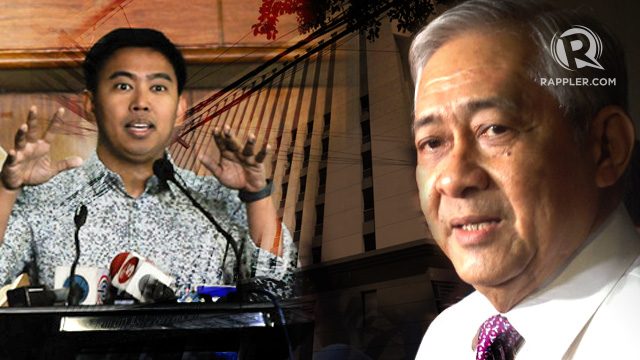SUMMARY
This is AI generated summarization, which may have errors. For context, always refer to the full article.

MANILA, Philippines – When Francis Jardeleza was solicitor general, he argued, in a petition to the Supreme Court, against the doctrine condoning past offenses of re-elected officials. Today, as member of the Court, he faces the same issue as justice-in-charge of the case filed by the Ombudsman versus Makati Mayor Jejomar Erwin “Junjun” Binay Jr.
The legal doctrine of condonation lies at the heart of the arguments of Binay Jr, whom Ombudsman Conchita Carpio Morales wants suspended from office for 6 months while her office investigates further serious allegations of corruption in the construction of the Makati City Hall parking building.
In his comment opposing the Ombudsman, Binay Jr cited cases decided by the Supreme Court which uphold condonation and extensively quotes from them. He said, lifting from past decisions:
“…a public official cannot be removed for administrative misconduct committed during a prior term since his reelection to office operates as a condonation of the officer’s previous misconduct…” and
“…an official’s reelection expresses the sovereign will of the electorate to forgive or condone any act or omission constituting a ground for administrative discipline which was committed during his previous term.”
(Binay Jr has been mayor since 2010. The reportedly overpriced parking building was constructed in phases, starting during the term of his father, Jejomar, and continued till the young Binay assumed office.)
The Ombudsman was stopped in her tracks by the Court of Appeals which sided with Binay Jr. The 3-member appellate court division issued a temporary restraining order (TRO), disregarding the Ombudsman’s 6-month preventive suspension order. Soon after, the CA sealed Binay Jr’s continued stay in office when it decided to halt his suspension indefinitely.
The Ombudsman elevated her case to the Supreme Court which will hold its second round of oral arguments on Tuesday, April 21.
‘Abandon or revisit doctrine’
That this landed on the lap of Jardeleza, who has been both solicitor general and deputy ombudsman, puts him at the center of a delicate case. As Justice Marvic Leonen remarked during the first round of oral arguments, “This is a difficult case not only because it is complex but also because it is political.”
Jardeleza is the most recent and, most likely, last appointee of President Benigno Aquino III to the Supreme Court. Binay Jr’s suspension from office is the first high-profile case he is handling.
In July 2012, Jardeleza filed a 73-page pleading with the Supreme Court, saying the “Court’s ruling that re-election condones previous misconduct of an elective office makes no sense.”
Using strong language, he continued: “We stand the possibility of being confronted with the stark reality that an official may amass wealth through graft and corruption and thereafter use the same to purchase re-election and thereby launder his evil acts.”
Similarly, this pending case, Office of the Ombudsman vs Governor Enrique Garcia et al, has to do with the preventive suspension of public officials in Bataan for “grave misconduct, dishonesty and oppression.”
The arguments in Jardeleza’s petition appear to be the template of the Office of the Ombudsman when carrying out probes of elected officials charged with graft and corruption.
Decisions in administrative disciplinary cases conducted by the Ombudsman, Jardeleza said, are “immediately executory, even if appealed by the penalized party. Thus, an erring or corrupt elective official is immediately made to pay the price for his wrongdoing in office as well as prevented from further defiling his office.”
He continued: “…the said elective official readily realizes the fact that corruption has now become a high-risk, low-reward undertaking.”
Thus, Jardeleza asked that the Court “abandon or revisit” the doctrine of condonation.
Now that he sits in the Court, will he stick to this position?
Sereno against condonation
During the oral arguments on April 14, condonation was only taken up briefly.
It was the Chief Justice, Maria Lourdes Sereno, who openly opposed it. She was emphatic in her argument: “It is important that this court deliver the correct message to 430,000 officials… We’re basically saying that these 430,000 officials can commit administrative offenses ranging from simple misconduct all the way to serious misconduct, and dishonesty. They just have to ensure that they get re-elected and any preventive suspension or any investigation or an administrative finding by the Ombudsman will have to stop.”
“Is that the message that is going to be delivered if we continue with the condonation doctrine?” Sereno asked.
Santiago bill
At the Senate, Miriam Defensor Santiago weighed in by filing a bill to cure this old doctrine that cripples the fight against corruption. She sought to amend the Anti-Graft and Corrupt Practices Act “by making an elective official liable for any violation of the Act although it was committed during a prior term and although the official was reelected.”
The bill was her response to Mayor Binay, who invoked the doctrine of condonation. “That is a cross-eyed simplification of the problem,” the outspoken senator said. “It is wrong to equate the reelection of a public official to condonation of his past criminal offenses.”
This legal doctrine has a long history, starting in the 1950s. Miguel Silos, in his Ateneo law school thesis, pointed out that at the time, the 1935 Constitution had no provisions on public office as a public trust or the duty of the State to maintain honesty and integrity in public office.
Under the 1987 Constitution, “more than any time in our history, it directs public officers to observe the strictest adherence to good conduct.” Silos argued that it is clear that “corruption, irresponsibility…are not to be tolerated and those who offend against these provisions must be removed from their positions…”
This big issue is now up to the Supreme Court to resolve – and it goes beyond Binay Jr and Morales. – Rappler.com
Add a comment
How does this make you feel?
There are no comments yet. Add your comment to start the conversation.